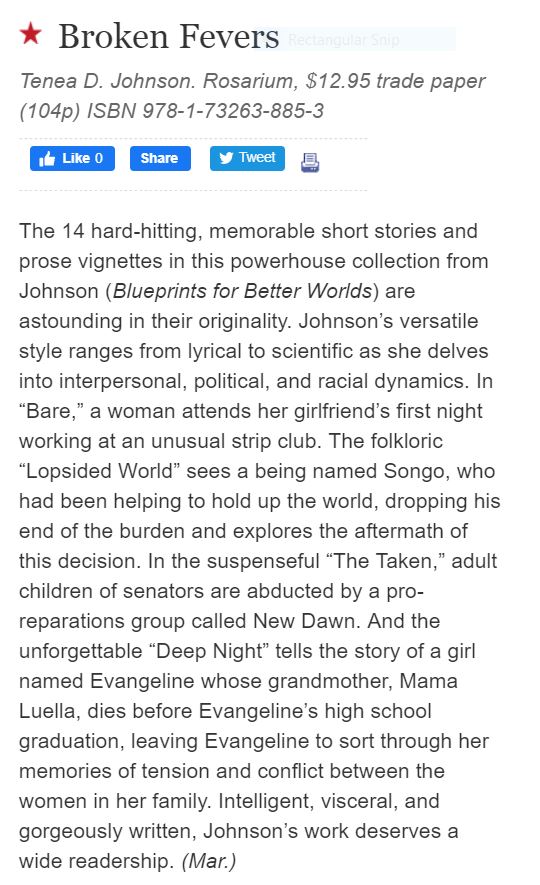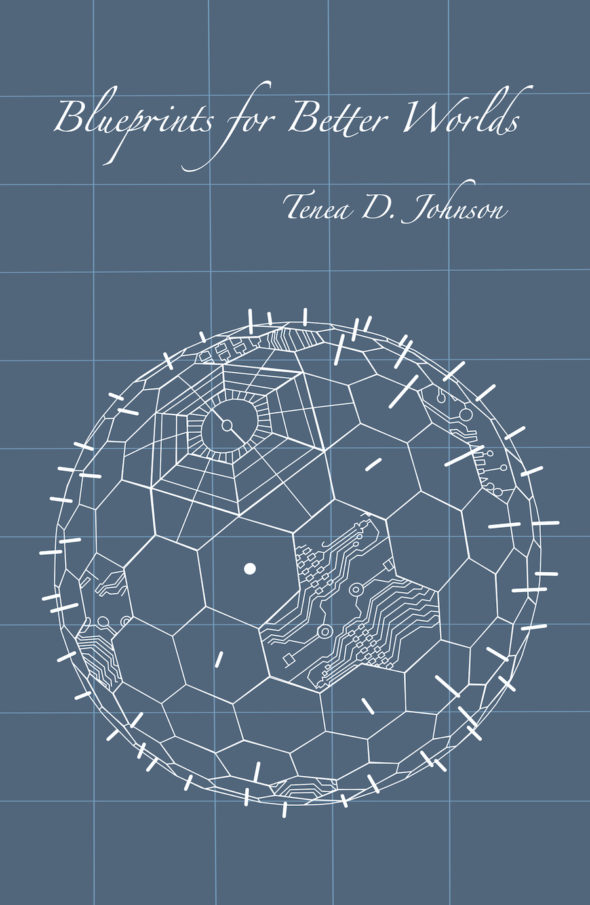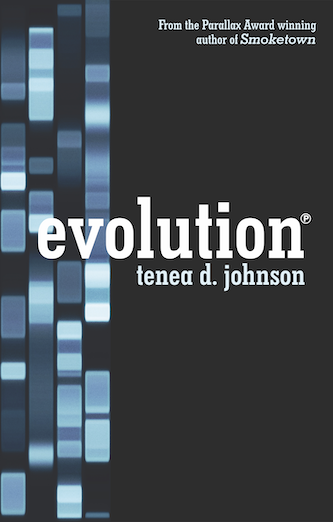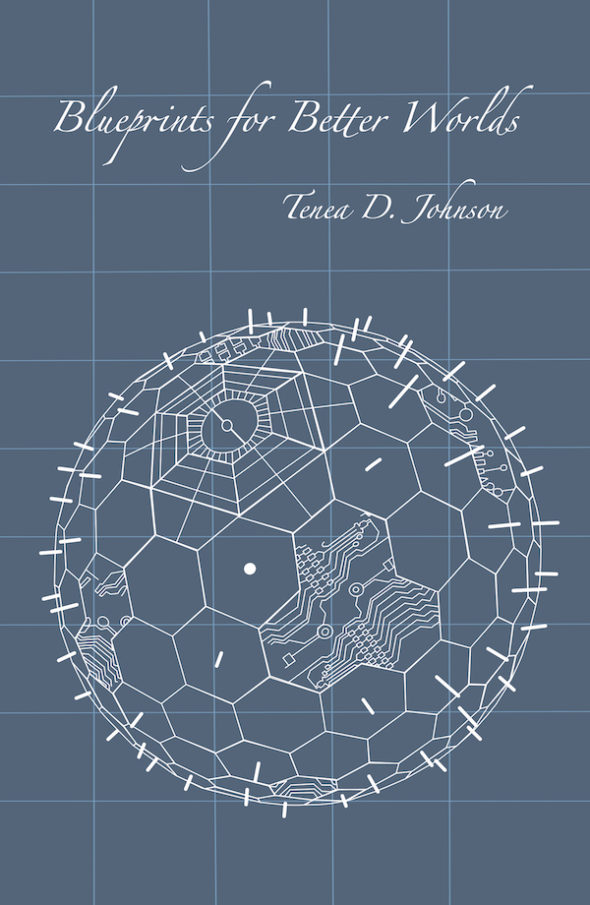3 Minutes with Nicole, editor of Slay: Stories of the Vampire Noire
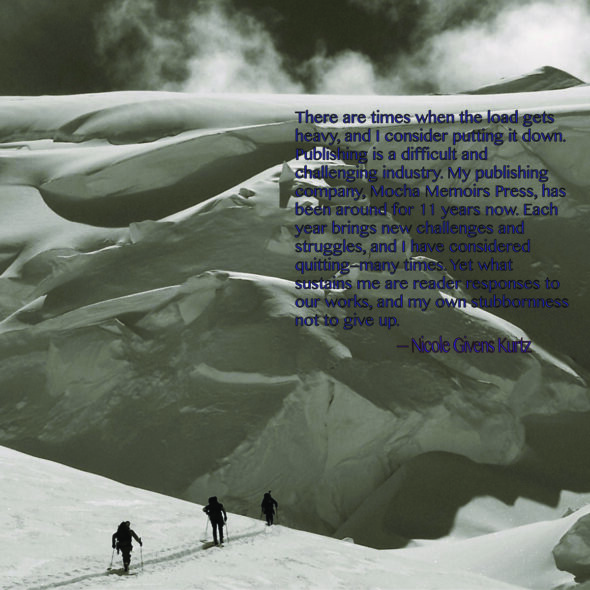
Original Photo from Pixabay/Pexels
Welcome the weekend with a closer look at Nicole Givens Kurtz, editor of Slay Vampire Noire and publisher of Mocha Memoirs Press. Below find a bit more about her and delve deeper into the work featured in the Afrofuturism and the Black Fantastic Storybundle available until July 2nd.
What’s your general approach to choosing works for an anthology?
My contribution to the Afrofuturism bundle is SLAY: Stories of the Vampire Noire.It is a collection of short stories that feature vampires or slayers from the African diaspora. My approach for choosing the works for this anthology involved seeking stories that had an emotional impact. Stories that lingered long after I had finished reading and stuck like peanut butter, their flavor continuing to permeate long after I’d ingested their content. Of course, I looked for clean drafts and well-rounded stories where the protagonist had agency and was from the diaspora, but the story’s impact mattered more to me with this anthology.
How do you define Afrofuturism?
I define Afrofuturism as creative art (music, art, writing, film) in which those of the African diaspora are depicted prominently in futuristic or alternate settings. An important aspect of Afrofuturism is in its ability to transcend one type of creative outlet. It’s in music, it’s in film, books, lifestyles. It’s a broad term, to be sure, but I think of it as an umbrella to which the other genres gather.
What compels you to keep writing/editing?
Readers and my own stubbornness keep me writing and editing. There are times when the load gets heavy, and I consider putting it down. Publishing is a difficult and challenging industry. My publishing company, Mocha Memoirs Press, has been around for 11 years now. Each year brings new challenges and struggles, and I have considered quitting–many times. Yet what sustains me are reader responses to our works, and my own stubbornness not to give up. I often feel the *break* I need and the press need are just around the corner, so I cannot stop–even when I have rounded many, many corners. LOL.
What are you working on now?
Currently I am working on a science fiction romance story. I just completed draft 0 of a horror novella that may or may not see the light of day. LOL. Mocha Memoirs Press continues to publish bold, fearless fiction. I encourage readers to sign up our newsletter and check out our blog for updated releases at mochamemoirspress.com.
3 Minutes with Michele T. Berger, author of Reenu-You
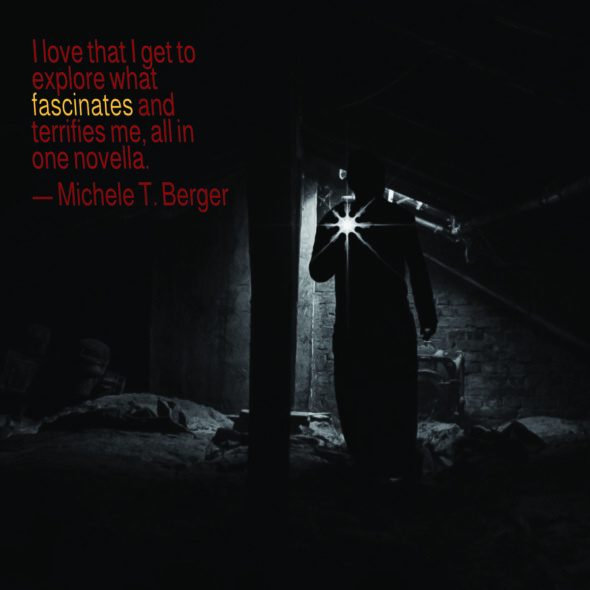
Original Photo by Lennart Wittstock from Pexels
Michele T. Berger, author of Reenu-You, shares its origin story, what’s next for her, and her influences. Reenu-You and the other fine work in the Afrofuturism and the Black Fantastic bundle is available until July 2nd.
What’s the first Afrofuturist/Black Fantastic/Black Scifi work you read? What was the last?
I read Toni Morrison’s Beloved in college and I consider the novel an example of the Black Fantastic. It’s a literary ghost story that ruminates on being, Blackness, death, slavery, memory and history. I read it in a literature class. The novel made an impression on me. The most recent Afrofuturist work I’ve read is Rivers Solomon’s stunning novel The Unkindness of Ghosts. It, too, ruminates on many of the themes explored in Morrison’s work.
Why this story?
Reenu-You is a speculative story with elements of psychological horror that explores what happens when a mysterious virus is seemingly transmitted through a hair care product billed as a natural relaxer. Reenu-You grew from several sources of inspiration. One was watching the drama unfold of a real hair product called ‘Rio’, marketed to women of color in the 1990s. Rio promised an easy and healthy alternative to other products on the market. Soon though women began reporting horrible reactions to Rio including itchy scalps, oozing blisters and significant hair loss. A class action lawsuit revealed that there was nothing natural, at all, about the product. It actually contained a number of highly acidic chemicals.
This news event grabbed me and gave me the inkling for the story. Over several years, I kept asking myself questions about why and how a scandal like that could happen and how different communities might respond to it. I speculated on the mindset of a company that not only deceived the consumer, but endangered their health. I also thought about the consumer, and what desires and longings Rio tapped into. Although I didn’t ever use Rio, I remember the seductive nature of their infomercials quite well. I, like other African American women, was transfixed by their upbeat, exotic marketing that promised an easy and healthy hair treatment.
In watching the events unfold, I thought about how trusting we are as consumers that the products we purchase will be safe. And, also how everyone in the 1990s started to fall for various items labeled ‘natural’. What if that wasn’t the case? What if a hair product that primarily women of color used harbored something deadly?
I’m also fascinated by viruses. I came of age during the height of HIV/AIDS and remember the terror, fear and stigma associated with the virus. For a long time there were conflicting reports about the transmission of HIV/AIDS and its origins. Often conspiracy theories and popular culture filled in the gap.
I wanted to play with the idea of conspiracy and how different communities might respond to a health crisis, especially before the era of ubiquitous cellphones and social media. A virus was a perfect fit.
Viruses are adaptable, disruptive and frequently are medical mysteries. In just the past two decades, we’ve seen Bird Flu, Swine Flu, SARS (Severe Acute Respiratory Syndrome), Zika, Ebola, and now COVID-19.
I’m also interested in the politics of beauty, female friendships and Black hair culture. In Reenu-You, I can play with these ideas by having different characters reflect on the complexity of their intimate and yet social choices. I love that I get to explore what fascinates and terrifies me, all in one novella.
What influences your work? People, other fields, other authors, events, histories?
Alice Walker, Toni Morrison, Gish Jen, Ntozoke Shange, Octavia Butler, Charles de Lint, Jonathan Lethem, Ursula Le Guin and Elizabeth Hand are writers that I return to again and again to learn from about voice and craft. In the past decade, I’ve been most influenced by the work of Sherri Tepper, Margaret Atwood, Walter Mosely, and Kevin Canty. Writers that I’m currently obsessed with are Cynthia Leitch Smith, Amy Tan, Jeff VanderMeer, Nnedi Okrorafor and Joy Castro. I find myself drawn to the late 1970s and early 1980s (when I was coming of age) and to African American cultural history of the 1920s.
What’s on your desk?
I don’t have a desk. I have an Ikea table that I have made do with for more than twenty years. On it, I currently have two laptops (a Mac and Lenovo, both tend to get glitchy at the same time), precarious piles of papers, journals, post-it notes and the recent book by Gail Carriger, The Heroine’s Journey: For Writers, Readers and Fans of Popular Culture. I also keep heart shaped and gold star stickers at hand. As a fun reward after a session, I’ll put one on my writing calendar. In answering this question, I see I need a bigger reward—a new desk.
What are you working on now?
I’m three drafts into a horror novel that takes place in the North Carolina areas of the Great Dismal Swamp. Prior to the Civil War, the Great Dismal Swamp housed many fugitive slaves and maroon communities. The novel will be published in the fall by Falstaff Books.
3 Minutes with Bill Campbell, co-author of Baaaad Muthaz
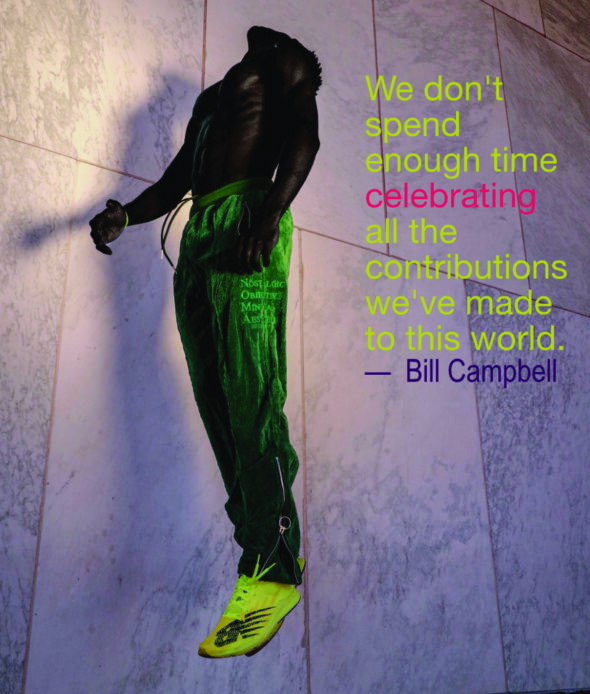
Original Photo by @onyx-scopes on Nappy.co
We start the week with Bill Campbell, whose graphic novel Baaaad Muthaz (co-authored with Damian Duffy and illustrated by David Brame) brings the visuals to the Afrofuturism and the Black Fantastic bundle until July 2nd. Take it away, Bill.
Describe this work in 3 words.
Spacefunk Pirate Booty!!!
What was the most difficult story/part of your novel to write? Why?
Baaaad Muthaz is an ode to Black music. However, record labels are very strict about quoting music lyrics, so it’s hard to refer to songs without actually using the lyrics. You can only use the songs’ titles. So, a lot of jokes wound up being untold.
What’s your favorite Afrofuturist or Black Fantastic work?
Ishmael Reed’s Mumbo Jumbo changed my world when I read it back in the day. It informed so much of what I do I’ll have to go with that.
Why this story?
I wanted to do something fun, and I wanted to celebrate the culture. We don’t spend enough time celebrating all the contributions we’ve made to this world.
How do you measure writing success?
There are certain challenges I put before myself with each project—something I don’t think I’d done before. So, if I’m able to pull whatever those challenges are with each project, I’ll generally consider that a success. I don’t know if outside markers really come into play so much (though your ego can play tricks on you) because writing, for me, is such a personal thing.
How do recent challenges of the day (the pandemic, post-Trump/post-Brexit) inform what you’re working on right now? Do they affect the context of this work? If so, how?
I just finished writing a Black superhero graphic novel project that’s heavily influenced by recent events, but I’m not ready to talk about it. It’s an absolutely insane ride, though. I can’t wait to share it with the world.
3 Minutes with Zig Zag Claybourne, Author of The Brothers Jetstream: Leviathan and Afropuffs Are the Antennae of the Universe
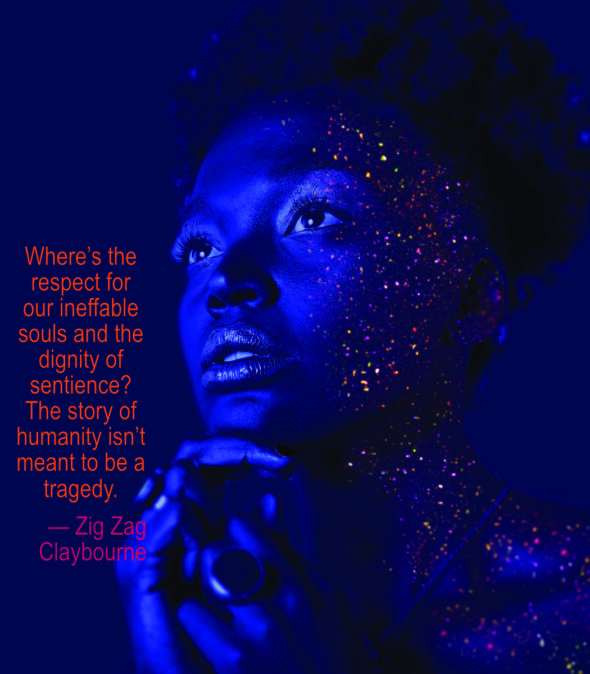
Photo by 3Motional Studio from Pexels
Zigs is bringin’ it. I’m gonna get out of the way. (If you want to hear more from this engaging mind and author of 2 books in the bundle, you can get the bundle until July 2nd).
Describe this work in 3 words.
“Oh, it’s on!” (3 more words: exciting, fun, real) (The Brothers Jetstream. For Afro Puffs, the 3 words would be “…and find out.”)
Have you witnessed the Black Fantastic or Afrofuturism in real life? If so, what was it?
Clearest recent example of Afrofuturism at work in my city, Detroit: to address the food deserts (lack of viable grocers) and the technology deserts (internet access—which should never have been commercialized in the first place–isn’t affordable for all, which places lots of Detroit students at a disadvantage) a group of Black community activists and tech activists came together and created free, secure wifi hubs in several of the most neglected areas of the city, along with donating computers. As for the food deserts, community gardens now dot the cityscape in the most beautiful of ways. These are two paths forward for those who faced brick walls. Afrofuturism is DIY. It’s attempting to find a harmonious way that might bring order to chaos.
What was the most difficult story/part of your novel to write? Why?
There’s a scene where a villain murders someone simply because they can. That sense of heartless impunity gutted me because way too much of our real world is exactly like that. People gone for no other reason than a person, a business, a community, a government—wanted them gone. Where’s the respect for our ineffable souls and the dignity of sentience? The story of humanity isn’t meant to be a tragedy.
What’s your favorite Afrofuturist or Black Fantastic work?
Parliament’s Mothership Connection. That entire album is a sci-fi novel spanning worlds, time, and dimensions!
Why this story?
This is the question that gets me bouncing like a hyped boxer. I’ve talked about it before (here for those interested) but short version: I personally wanted an epic tale about Black brothers constantly saving the world, one where they’re always doing it “one last damn time.” I looked for that epic tale. Something wild, something that poked fun at tropes but in a way that brought the reader along for the joke yet had heart. I couldn’t find one. So I squared my shoulders and wrote the ultimate adventure I wanted to read.
As for its sequel AFROPUFFS ARE THE ANTENNAE OF THE UNIVERSE: that was meant from day one to stomp male fragility. If I saw one more fanboi come for a sista (in particular, women in general) in genre…I was ready to act a fool. 2020 called for a story with an all-woman crew; an adventure where a shameless “Kirk” speech delivered by the captain of that crew felt right on time; a sci-fi story wherein idiocy got trounced like it owed everybody money.
Name one darling you killed before the final draft.
Fiona Carel. The crew in PUFFS are the women from The Brothers Jetstream: Leviathan. I wanted to bring Fiona Carel over from The Brothers Jetstream same as I did the crew. Fiona’s Irish, white, and sensitive to the multiverse. I wrote entire sections of her doing angsty multiverse stuff…but ultimately the story said nerp, not this time. As much as I love her character, she distracted from the Black Girl Magic this romp delivers.
What subject do you find most difficult to write about?
I’m not a fan of centering Black trauma, particularly in sci-fi/fantasy arenas. There’s this pernicious notion that pain is intrinsically and specifically tied to Black skin, be it on the Continent or via the diaspora, which tells me that regardless of the surrounding plot, the only story too many people want to hear from us is how we deal with the “pain” of being Black. Listen, I grew up listening to Earth Wind & Fire and Prince; I got the rhythms of the ancients in me! I can bring the thunder and lightning, but I play in the joyous rain.
What direction would you like to see Afrofuturism and/or the Black Fantastic go? What would you like to see come of this moment of greater recognition?
My hope is that readers realize Afrofuturism and the Black Fantastic (which damn well needs to be a band name) are more than solely entertainment to pass the time, they’re building blocks to actual social change far past the status quo. Whether comedy, adventure, fantasy, drama, romance–art is meant to connect us to something more than we started with.
How do you measure writing success?
First, by how much fun I had with the story. Second, by how satisfied I am with the story’s soul upon completion. Third, did readers feel like I honored their time? Anything after that is whipped cream on top of pie.
What’s your approach to worldbuilding?
I’m a fan of the less-is-more approach. As a writer and a reader, I like to wander a story’s playground to find interesting toys and attractions. If I’m reading your zombie sci fi novel I don’t want a page of exposition telling me about the planet’s atmosphere, the evil mining corporation that abandoned folks, and the marital backstories of the two main protagonists. I want “There weren’t enough of us left to bury the bodies…”
What’s the first Afrofuturist/Black Fantastic/Black Scifi work you read? What was the last?
Dhalgren by Samuel Delany was the first, a book which opened me to wonderful new ways to tell a story. The Space Between Worlds by Micaiah Johnson is the latest, a wonderful journey through the multiverse. Both books share an expansive sense of scope and character, which I love.
What are you working on now?
In March 2020 I had a short story published at GigaNotosaurus about a mother and daughter witch team from a secondary-world version of Africa traveling the world. It was called “The Air in My House Tastes Like Sugar”. The characters spoke to me so much I wanted to see what they did next. Result? A fantasy novel about this mother & young daughter having the adventure of their lives.
What compels you to keep writing/editing?
Questions. Not understanding things. Writing helps me see the world’s bones and tendons at work. I may leave this world not having figured a single thing out, but at least I can say I made the attempt.
3 Minutes with Zelda, Co-Editor of Dominion: An Anthology of Speculative Fiction from Africa and the African Diaspora
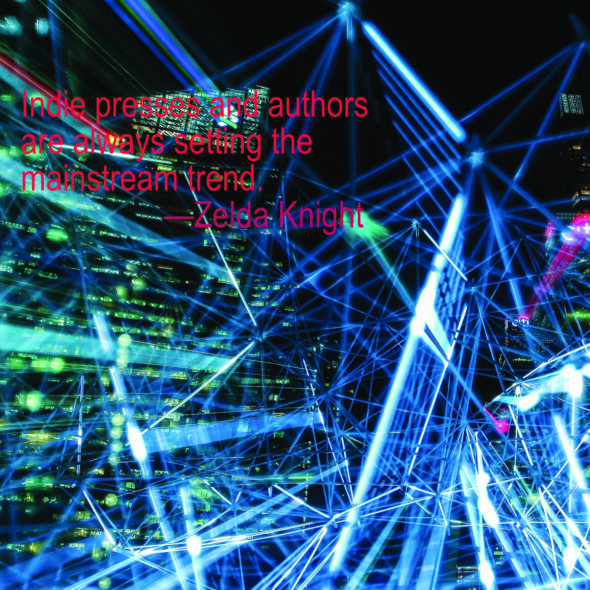
Original Photo from Pexels
While the Afrofuturism and the Black Fantastic storybundle is going on (until July 2nd), I’ll be sharing a little about some of the editors and other authors in the bundle. Zelda Knight, coeditor of Dominion: An Anthology of Speculative Fiction from Africa and the African Diaspora kicks us off.
Describe this work in 3 words.
African / Diasporic Unity
Editors, what’s your general approach to choosing works for an anthology?
When selecting works for an anthology, I always go through a similar mental checklist: does it follow the requirements, is it on theme, and does it mesh well with other accepted works or offer a contrasting view? If a work satisfies all three, then I take the time to really dive in. I’m mindful of how hard it is to put something you created before a stranger’s eyes, and try to keep that in mind even when I have sharp critiques.
What compels you to keep writing/editing?
There are always new worlds to discover and voices that need to be heard. If gatekeepers aren’t going to publish them, I can’t complain that these stories aren’t being told when I have the expertise to make that happen. Indie presses and authors are always setting the mainstream trend.
The world is awash in terms right now: Afrofuturism, Africanfuturism, Black Speculative Fiction, the Black Fantastic, Astroblackness, etc. Do they matter? If so, do they do justice to the diaspora? If not, how might we as authors and editors lead a change? Feel free to offer any new terms you think would expand and/or deepen the concept.
I think so to some people. As long as authors are actually taking the time to properly cite the foremothers, forefathers, and so on of these terms (in particular Afrofuturism that is receiving a lot of undue criticism as of late), I don’t personally care. No one term can “do justice” to the diaspora because the African Diaspora is truly global, and many are created with specific experiences in mind. The experience of people of African descent are linked but not identical, you know? I’m personally of the philosophy that authors should (a) use what works for them, (b) respect the work of who came before them before launching critiques, and (c) the publishing world should take time to respect which labels people place on their own works. The last would be the real change.
What are you working on now?
I’m working on personal work in the sci-fi and fantasy romance realm all the time. I’d recommend my novelette, Zephyr’s Curse, if you want a small taste of the stories I tell. Anthology-wise, I’m co-editing a number of Afrocentric anthologies with Oghenechovwe Donald Ekpeki and Sheree Renée Thomas!
Frequencies, a Fiction Album Is Here
They’re all special to me but something a little different this time. Just between you and me, there will be a damn fine deal on this one next week, but for those who hate waiting, you can hear the opening now. And if you absolutely loathe it, you can get your own copy from a secure site, complete with a bonus track.
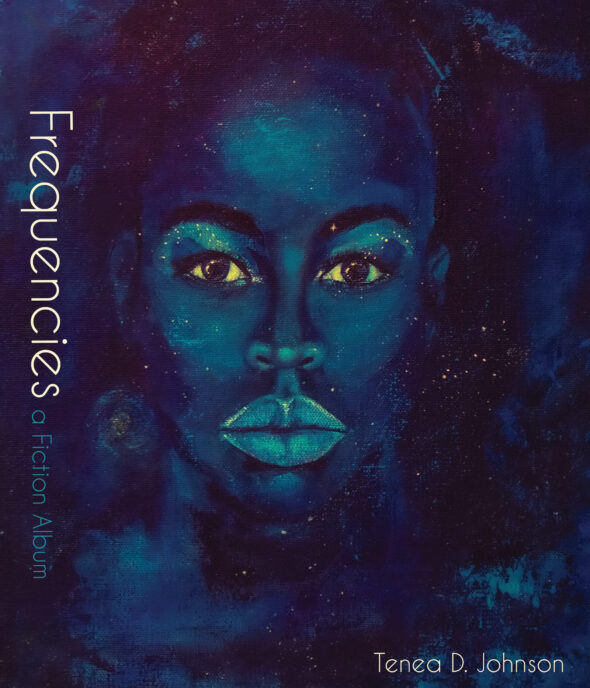
Cover Art by Kelly U. Johnson
NSPN Afrofuturism Panel with Linda Addison, Kiini Ibura Salaam and Andaiye Reeves-Smith
I had such a great time on this National Science Policy Network panel with my esteemed fellow panelists I thought I’d share. I expected a panel and instead got the best group discussion I’ve had in too long, and all for such an excellent organization.
Broken Fevers Virtual Book Launch
To register for the upcoming book launch, 3.3.21, please see the Google Form here.
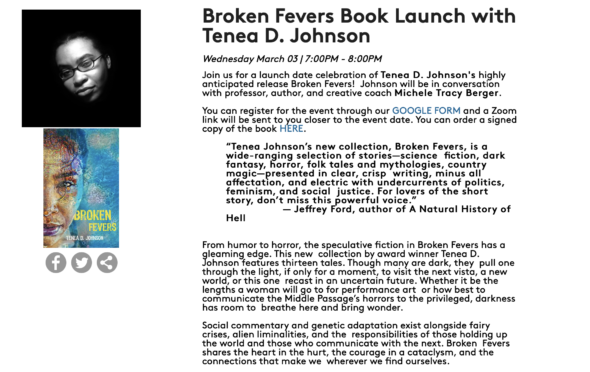
Black Fantastic, Buoyant and Bold: A Reading in Conjunction with Derrick Adams’ Exhibition
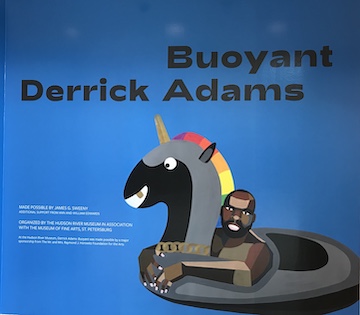 I look forward to reading the Black Fantastic and Afrofuturism into the space of joy Derrick Adams has created with his Floaters series. It’s an honor to do it alongside such a fine selection of Black scholars and artists.
I look forward to reading the Black Fantastic and Afrofuturism into the space of joy Derrick Adams has created with his Floaters series. It’s an honor to do it alongside such a fine selection of Black scholars and artists.
Find details about the full host of associated events here.
And for tickets to my reading, October 22nd, 2020, click here.
New Smoketown Review
The Lesbian Review had some kind words to say about Smoketown. I did not pay them; they’re safe to believe. Read them here.
Revolution Series Available at Excellent Online Indie Bookshops
I’m proud of the partnerships I’ve forged with online indie bookshops. These shops makes it easier for readers to find the stories and characters that will, for a time or forever, live in their minds and become part of their lives. The people running the shops have a passion for literature and introducing readers to new worlds. In that regard, 2020 has been a good year. Both Sistahscifi.com and Scarlet Ferret now offer the books in the Revolution world: R/evolution and Evolution — Sistahscifi has the paperbacks and Scarlett Ferret the ebooks. If you didn’t know, now you know.
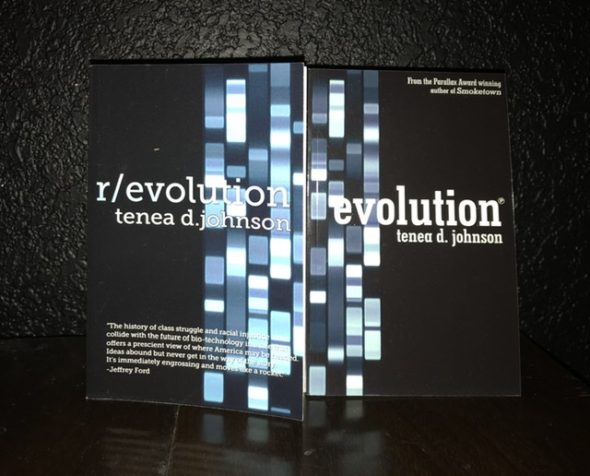
Broken Fevers Cover Reveal
Quite pleased to share the cover of my upcoming collection, Broken Fevers, out from Rosarium Publishing in November. Art by Nettrice Gaskins and title design by Bizhan Khodabandeh. I think they did a fantastic job.
The Seers Table: Dark Love from the Horror Writers Association
The seers saw me. The Horror Writers Association has shined a light on me and a trio of other authors. Thanks to Tish Booker, who I sufficiently disturbed to merit consideration. She clued in on themes that will find life in a new professional expansion. More on that later. For now, pull up a chair to The Seers Table
Evolution Review
Evolution’s first review is in: Apart from a story arc that spans the best part of 200 hundred years, there’s one particular aspect that stands out most clearly about Evolution. Johnson writes hope into her work. She builds it in, gently, quietly, without fanfare. It isn’t obvious at first, just a soft nudge here and there—in the face of gassed populations, dengue fever and total injustice, you think you’re mistaken at first. Around every page turn, you’re expecting disaster, and there are enough of those to justify the lack of belief you have that hope could even be a thing in such a world. But keep reading.For that, Johnson is currently my total writing hero….
Evolution Ebook Is Available for Preorder
The ebook will be released June 21st, but it’s available for preorder now. 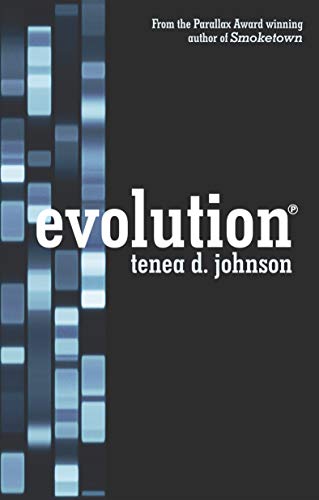
Afrofuturism, Best of and Next Up
Here, a miniretrospective: On this last day of the storybundle, current Afrofuturist authors/editors share their favorite works and what they’d like to see in Afrofuturism’s future.
What’s your favorite Afrofuturist work?
Octavia’s body of work. It’s hard to pick. Wild Seed, Kindred, Parable of the Sower, Xenogenesis Trilogy, etc.
—Andrea Hairston
It’s a tie between Octavia Butler’s Mind of My Mind and her short story, “The Evening, the Morning, and the Night.” The first is a novel, the latter a short story. I’d call them some of her lesser known works but for me, they are so efficient and clean, with an emphasis on the joy of the plot, that they’re hidden gems. No offense to Parable of the Sower or the other more stand out works by Ms. Butler, but I like a tight stand-alone narrative with no wasted plot points, characters, or words. And she delivers with those two tales.
—Ayize Jama-Everett
This is an easy one, Dawn by Octavia Butler.
—Nicole Givens Kurtz
Empire Star, by Samuel R. Delany. It’s available from Wesleyan, and I was able to get permission to reprint it in the Lightspeed People of Colo(u)r Destroy SF anthology.
—Nisi Shawl
Well, Sun Ra, is way up there, mindblowing, and there’s so many more, but if pushed, I’d have to go with Samuel R. Delany’s Babel-17, which I bought well-worn from a street bookseller in Harare when I was 16.
—Ivor Hartmann
What direction would you like to see Afrofuturism go in? What would you like to see come of this Afrofuturism moment?
I want Afrofuturism to go every direction. I want the Afrofuturist moment to last a very long time!
—Andrea Hairston
Oh, we a movement now? Awesome. I want reparations then. I kid. Not really. Seriously though I’m not sure what people mean by a movement. I mean, are there Afrofuturist publishers, agents, cinema houses, and lawyers? Do we have a Samuel Delany Center for the Study of Afrofuturism and its offshoots going somewhere? If so, awesome. If not, I think it’s just a popular cultural phase right now. Don’t get me wrong, I’m glad a lot more folks are getting the shine on their names. Folks that have been grinding for years at this are finally able to eat off of it. I hope to one day be among them. But even so, I know that the diversification of both approach and narrative are key in order to stay fed. I think about Jordan Peele. The man started out on MADtv. And after over a decade he made a blockbuster on a shoestring budget, which can only nominally be called sci-fi. But folks are claiming him as Afrofuturist royalty. Awesome! The more the better. But is it about Afrofuturism or just finally acknowledging that black people who create in this country and throughout the world do so with more than white audiences in mind? Maybe publishers, agents, editors, producers, and directors are finally just coming to realize that the same weird, creepy, and geeky things that have obsessed the dominant culture have also intrigued black creatives and audiences. And sometimes, our approaches to said weirdness are more intriguing than the standard fair. You want to call that a movement? Cool. Me, I say it’s just awesome people of color continuing to do what we’ve always done, only now some of us are being recognized for it.
—Ayize Jama-Everett
I would like to see Afrofuturism continue to incorporate all areas of media. I would love to see more TV and film media embrace authentic Afrofuturism. Black Panther had the backing of Disney, but many independent filmmakers are producing quality works but cannot get the distribution. How do we harness that hunger to our advantage? How do we connect those people who adored Black Panther to our independent works? I want to see the movement embrace all Afro-centric stories, not just those rooted in Africa, but from the other countries in the diaspora, including the U.S. Most importantly, there is amazing work being created in comics, novels, films, and music, but have not reached the audience necessary to be as big as I think it can be.
—Nicole Givens Kurtz
3 Minutes with Andrea, Author of Will Do Magic for Small Change
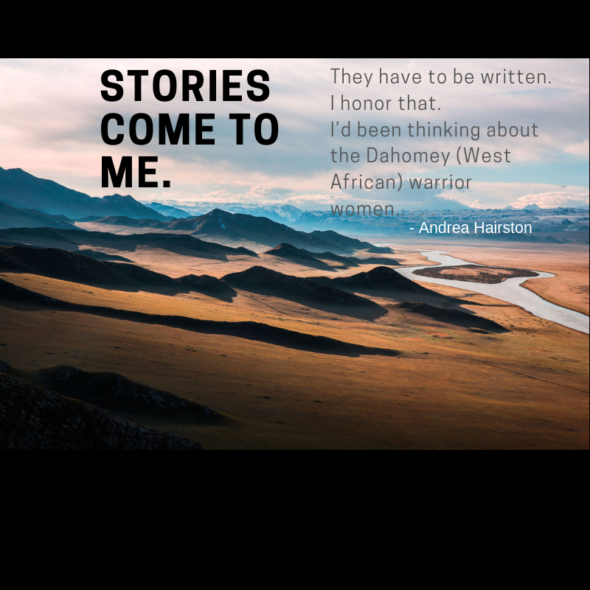 With just a little over a day left on the Afrofuturism storybundle Andrea Hairston shares her thoughts on working in different forms and the intersection of Will Do Magic
With just a little over a day left on the Afrofuturism storybundle Andrea Hairston shares her thoughts on working in different forms and the intersection of Will Do Magic
How does being a playwright inform your work?
I am a dramatic storyteller. Drama is about the poetry of action. Meaning is in the juxtaposition of actions, in the clash of character choices and consequences. Theatre is about embodying the other—acting who you are not, writing another world, experimenting with reality. Theatre takes me right to speculative world building and stories beyond mimetic realism.
Why this story?
Stories come to me. They have to be written. I honor that.
I’d been thinking about the Dahomey (West African) warrior women who supposedly appeared at the Chicago World’s Fair for a long time. There’s a moment in an earlier novel, Redwood and Wildfire, where they also appear. So why not have an alien from another dimension meet them and learn the world from their perspective? Why not connect Redwood and Wildfire’s granddaughter with the alien?
Describe this work in 3 words.
Alien Ancestor Theatre-magic
How do you measure writing success?
Success is telling the stories you want to tell, how you want to tell them.
Success is challenging yourself and showing up every day for that challenge.
Success is having the generosity of spirit and the humility to connect with and support other artists.
Success is never giving up on getting better, but taking pleasure in what you have achieved.
3 Minutes with Ayize, Author of The Liminal People
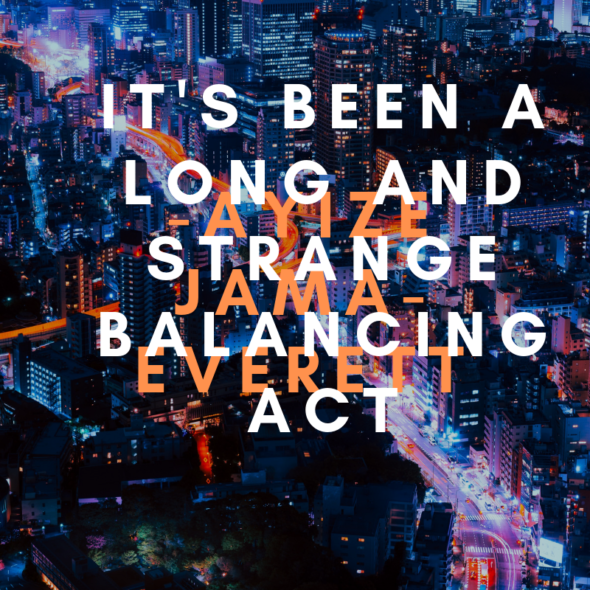
Ayize Jama-Everett’s The Liminal People is also featured in the Afrofuturism Storybundle. Here, a closer look at writing and the work:
How does liminality manifest in your life?
How does it not?! I’m forever between the now and the later, the done and the doing. It’s a character trait flaw that makes contentment an accomplishment for others and not myself. Despite being born black in Harlem to politically minded folks, I used to refer to myself as a Black Cultural Refugee, before black geeks became cool. I have three master’s degrees and no Ph.D. I’m in the middle of the world and my understanding of it. Yes, liminality is manifested in my life.
Describe this work in 3 words.
Traveled. Troubled. Family.
Why this story?
This story was a compromise between the expansive multi-dimensional tale I wanted to tell and the intimate close narrative that the epic needed to be based in. It’s been a long and strange balancing act.
What subject do you find most difficult to write about? The most effortless?
Can they be the same thing? I love writing about fights and food. My next novel should be about food fights. But the choreography of physical combat and the innate sensualness of anything that is offered to the mouth make the writing effortless and enjoyable. I tend to stay away from real life events though I have experimented. Nonfiction is probably something I should push myself to write more but I think I need to hang in some plain old narrative fiction for a while before I do that. The idea that a mundane life can be worthy of insight given the proper attention to the craft of writing is not revelatory but expansive for a kid who grew up reading sci-fi and comics.
3 Minutes with Nicole, author of Silenced
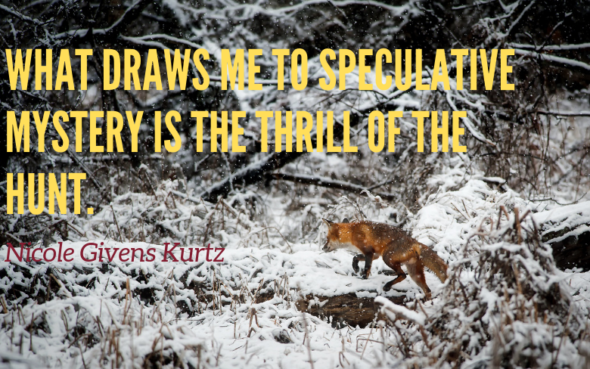
From the Afrofuturism Storybundle, we have Nicole Givens Kurtz, author of Silenced on speculative mystery, this particular one, Afrofuturism and more.
What are 3 questions/answers on the FAQ page of Silenced?
What is a private inspector? An inspector in a detective, but in the future, they’re all called inspectors due to a change in governance from the United States to meddling by the British.
Why are the United States divided? The U.S. is divided after a second Civil War. Each territory is governed however they see fit. Some territories have dictators. Others have a socialist system. It depends on the territory. In Cybil Lewis’s The District, the governor acts as the leader of the territory in conjunction with Congress.
What weapons does Cybil use? Cybil has two guns, a lasergun 350 and a pug, which is a short revolver with laserpowered cartridges that must be charged.
What was the most difficult story/part of your novel to write? Why?
The most difficult part of Silenced was the death scene. I won’t give away who dies, but the death hurt my heart. Like Cybil, I wanted that character to live, to fulfill the promise they had, but it didn’t happen that way. I cried after I wrote it and I pushed back from my computer. I had to take a few minutes to collect myself. I skipped that chapter often when I re-read the book. It happens so often in real life, that it hit me hard, square in the feels.
How about small press/indie publishing, what do you find most difficult?
I’m a hybrid author. That means I am both self-published and published by a publishing company. The challenges of both are marketing, finding an audience, and sustainability.
What draws you to speculative mystery?
What draws me to speculative mystery is the thrill of the hunt. The chase to discover who is responsible for the crime. Can our protagonist discover the culprit? How does she/he discover the culprit? I love the introductions into worlds of light and dark.
Do you have any writing tics?
I do have writing tics. I cannot write if my desk is messy. I am frozen with anxiety. I also have a hard time writing if my handwriting is messy or sloppy. I will rip the paper off the legal pad and rewrite it. I do this often as I tend to cross out items as I write longhand!
What direction would you like to see Afrofuturism go in? What would you like to see come of this Afrofuturism moment?
I would like to see Afrofuturism continue to incorporate all areas of media. I would love to see more TV and film media embrace authentic Afrofuturism. Black Panther had the backing of Disney, but many independent filmmakers are producing quality works but cannot get the distribution. How do we harness that hunger to our advantage? How do we connect those people who adored Black Panther to our independent works? I want to see the movement embrace all Afro-centric stories, not just those rooted in Africa, but from the other countries in the diaspora, including the U.S. Most importantly, there is amazing work being created in comics, novels, films, and music, but have not reached the audience necessary to be as big as I think it can be.
3 Minutes with Ivor, Editor of AfroSF
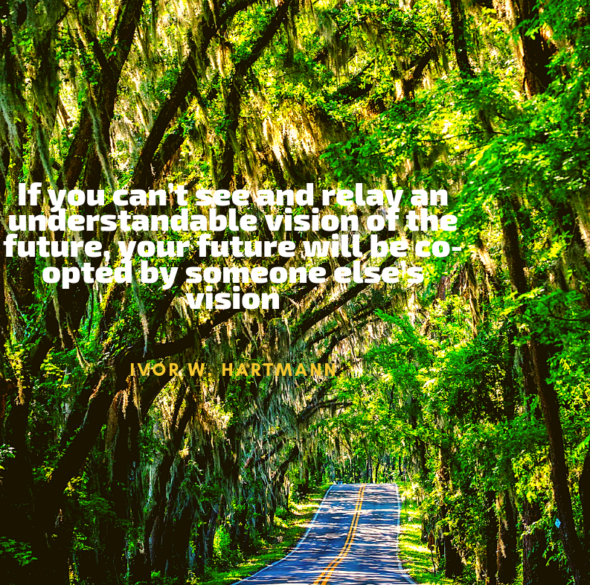
Next up from the Afrofuturism storybundle is Ivor W. Hartmann – editor, writer, publisher and visual artist – on the AfroSF anthology series and editing’s intersections with writing.
In what way ways has the AfroSF anthology series surprised you?
When the first AfroSF came out in 2012, I was blown away by the warm and welcoming reception it received from the international SF community; it was very heartening. As writers we are just trying to do our own thing, and back then hardly anyone was publishing our SF locally or internationally, so we just did it ourselves. So this reception meant a lot, that we could thrive locally and internationally, that there was a confirmed positive interest in what we were doing.
Describe this work in 3 words.
African Science Fiction.
Why this work?
Science Fiction is the only genre that enables African writers to envision a future from our African perspective. Moreover, it does this in a way that is not purely academic and so provides a vision that is readily understandable through a fictional context. The value of this envisioning for any developing country, or in our case continent, cannot be overstated nor negated. If you can’t see and relay an understandable vision of the future, your future will be co-opted by someone else’s vision, one that will not necessarily have your best interests at heart. Thus, Science Fiction by African writers is of paramount importance to the development and future of our continent.
You write and edit. In what ways does each inform your work in the other?
I think they work very well together; writing makes you a better editor and editing makes you a better writer. The tricky part, so tricky, is having a healthy time balance between them, something I have yet to achieve. As an editor understanding fully the writing process—the massive space stories take up in one’s mind and how so little of that makes the page, and yet without it the page would be bare—is invaluable. Likewise as a writer fully understanding the editing process—the quest to help refine a story to its best possible form whilst fully retaining the writer’s voice—is an imperative, to know that there is no writer who can fully and properly edit themselves, how an editor’s outside perspective is integral to the writing process.

